Education — inspiring societal change
“Education is the most powerful weapon which you can use to change the world.”
(Nelson Rolihlahla Mandela, 1918-2013)
This page contains books, peer reviewed academic publications, my Ph.D. thesis and selected research reports and other writings. Persistent global poverty, inequality and climate change are among the biggest challenges now facing humanity. COVID-19 has accentuated the difficulties. An educated public is clearly instrumental if a swift and comprehensive transition to a sustainable and more equitable low-carbon global society is to succeed. Featured publications aim to make a contribution.
The power of education has been known for millennia. More than 2,300 years ago the Greek philosopher Aristotle (384-322 BC), student of Plato and one of the most influential teachers of all times, identified education as the kingpin of societal transformation: “All who have meditated on the art of governing mankind have been convinced that the fate of empires depends on the education of youth.” Centuries later German-born Physicist and Nobel Prize Winner Albert Einstein (1879-1955) stressed the duty to publish truth: “By academic freedom I understand the right to search for truth and to publish and teach what one holds to be true. This right also implies a duty: one must not conceal any part of what one has recognized to be true. It is evident that any restriction of academic freedom acts in such a way as to hamper the dissemination of knowledge among the people and thereby impedes national judgment and action.” Disseminating truth and knowledge has never been more important.
AUTHORED AND EDITED BOOKS ▲
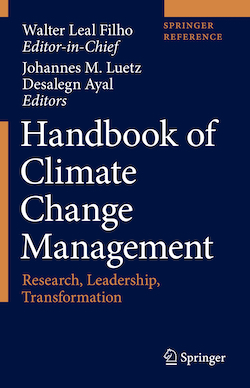 |
Leal Filho, W., Luetz, J.M., & Ayal, D. (Eds.). (2021). Handbook of Climate Change Management—Research, Leadership, Transformation. Switzerland: Springer Nature.
Forthcoming: https://www.springer.com/gp/book/9783030572808
About this book:
Climate change is one of the major challenges of modern times. Its impacts are manifold and vary from sea level rise (especially relevant to those living in coastal areas), to the increased frequency of extreme events such as cyclones and storm surges, which not only poses problems to property and infrastructure, but also to human health. Climate change is also associated with damages to the physical and natural environment, as well as to biodiversity. According to the 5th Assessment Report produced by the Inter-Governmental Panel on Climate Change (IPCC), many geographical regions across the world are moderately or highly vulnerable to climate change, whose impacts may be further exacerbated by other human-induced pressures. The above state of affairs illustrates the need for a better and more holistic understanding of how climate change affects countries and regions on the one hand, but also on how the many problems it causes may be managed on the other, vis-a-vis a better ability to adapt. There is also a perceived need to showcase successful examples of how to duly address and manage the many social, economic and political problems posed by climate change around the world, in order to replicate and even upscale the successful ones. It is against this background that the Handbook of Climate Change Management has been produced. It contains papers prepared by scholars, social movements, practitioners and members of governmental agencies, undertaking research and/or executing climate change projects, and working with communities across all geographical regions. The Handbook focuses on “Research, Leadership, Transformation”, meaning that it serves the purpose of showcasing the role these key areas play in respect of applied research, field projects and best practices to foster climate change adaptation worldwide.
[Download Flyer] |
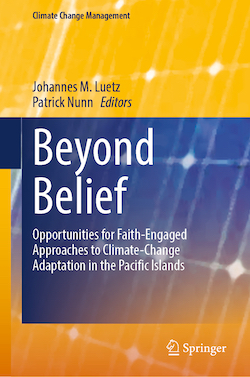 |
Luetz, J.M., & Nunn, P.D. (Eds.). (2021). Beyond Belief: Opportunities for Faith-Engaged Approaches to Climate-Change Adaptation in the Pacific Islands. Switzerland: Springer Nature.
Chapters: https://doi.org/10.1007/978-3-030-67602-5
About this book:
This interdisciplinary book explores the science and spirituality nexus in the Pacific Islands Region and as such makes a critical contribution to sustainable climate change adaptation in Oceania. In addition to presenting case studies, literary analyses, field projects, and empirical research, the book describes faith-engaged approaches through the prism of:
• Context: past, present, and future prospects
• Theory: concepts, narratives, and theoretical frameworks
• Practice: empirical research and praxis-informed case examples
• Doctrine: scriptural contributions and perspectives
• Engagement: enlisting religious stakeholders and constituencies
Comprising peer-reviewed works by scholars, professionals, and practitioners from across Oceania, the book closes a critical gap in the literature and represents a groundbreaking contribution to holistic climate change adaptation in the Pacific Islands Region that is scientifically sound, spiritually attuned, locally meaningful, and contextually compelling.
[Download Introduction] |
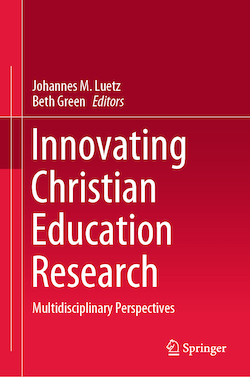 |
Luetz, J.M., & Green, B. (Eds.). (2021). Innovating Christian Education Research—Multidisciplinary Perspectives. Singapore: Springer Nature.
Chapters: https://doi.org/10.1007/978-981-15-8856-3
About this book:
This book reformulates Christian education as an interdisciplinary and interdenominational vocation for professionals and practitioners. It speaks directly to a range of contemporary contexts with the aim of encouraging conceptual, empirical and practice-informed innovation to build the field of Christian education research. The book invites readers to probe questions concerning epistemologies, ethics, pedagogies and curricula, using multidisciplinary research approaches. By helping thinkers to believe and believers to think, the book seeks to stimulate constructive dialogue about what it means to innovate Christian education research today. Chapters are organised into three main sections. Following an introduction to the volume’s guiding framework and intended contribution (Chapter 1), Part 1 features conceptual perspectives and comprises research that develops theological, philosophical and theoretical discussion of Christian education (Chapters 2-13). Part 2 encompasses empirical research that examines data to test theory, answer big questions and develop our understanding of Christian education (Chapters 14-18). Finally, Part 3 reflects on contemporary practice contexts and showcases examples of emerging research agendas in Christian education (Chapters 19-24).
[Download Introduction]
|
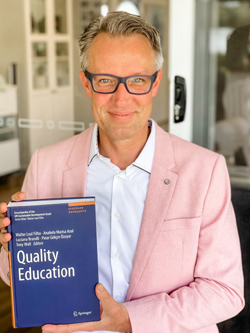
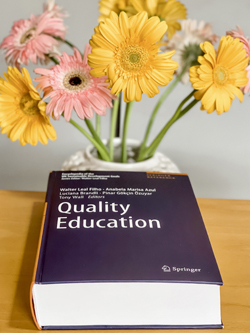 |
Leal Filho, W., Marisa Azul, A., Brandli, L., Gökcin Özuyar, P., Wall, T., and seven Section Editors [including Luetz, J.M.] (2020). Quality Education—Encyclopedia of the UN Sustainable Development Goals. Switzerland: Springer Nature.
Chapters: https://doi.org/10.1007/978-3-319-95870-5
About this book:
Comprising 100 book chapters, Quality Education is Vol. 4 of the peer reviewed multivolume edited Encyclopedia of the UN Sustainable Development Goals—Transforming the World We Want, the largest editorial project on sustainable development ever undertaken, and the world’s most comprehensive publication on the United Nations SDGs. Comprising 17 volumes and 1,700 book chapters, the encyclopedia is part of Springer Nature’s award-winning World Sustainability Series. It comprehensively addresses the UN SDGs in an integrated way. Each of the 17 volumes is devoted to one of the 17 SDGs. Vol. 4 Quality Education addresses SDG 4, namely “Ensure inclusive and equitable quality education and promote lifelong learning opportunities for all”. Having approximately 1,000 pages, the volume:
• Explores ways to ensure inclusive and equitable education
• Promotes lifelong learning opportunities for all
• Fosters knowledge to support the UN Sustainable Development Goal to ensure sustainable consumption and production
Johannes Luetz was one of seven Section Editors who worked on the book for three years, coordinating the peer review of different sections and recruiting and supporting chapter authors from national and international universities.
Download OA Sample Chapter Vol. 13 Climate Action (SDG 13: “Take urgent action to combat climate change and its impacts”): Johannes M. Luetz: Climate Refugees: Why Measuring the Immeasurable Makes Sense Beyond Measure |
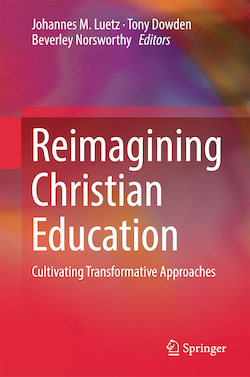 |
Luetz, J.M., Dowden, T., & Norsworthy, B. (Eds.). (2018). Reimagining Christian Education—Cultivating Transformative Approaches. Singapore: Springer Nature.
Chapters: https://doi.org/10.1007/978-981-13-0851-2
About this book:
This book is an arresting interdisciplinary publication on Christian education, comprising works by leading scholars, professionals and practitioners from around the globe. It focuses on the integrated approaches to Christian education that are both theoretically sound and practically beneficial, and identifies innovative pedagogical methods and tools that have been field-tested and practice-approved. It discusses topics such as exploring programmes and courses through different lenses; learning challenges and opportunities within organisational management; theology of business; Christian models of teaching in different contexts; job preparedness; developing different interpretive or meaning-making frameworks for working with social justice, people with disability, non-profit community organisations and in developing country contexts. It offers graduate students, teachers, school administrators, organisational leaders, theologians, researchers and education practitioners a fresh and inspiring reimagining of Christian education perspectives and practices and the ramifications of their application to life-long learning.
[Download Flyer] |
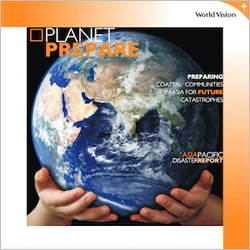 |
Luetz, J.M. (2008). Planet Prepare—Preparing Coastal Communities in Asia for Future Catastrophes. Los Angeles / Singapore: World Vision International.
https://www.wvi.org/asia-pacific/publication/planet-prepare
From the Preface:
Disaster Preparedness: The word “disaster” is derived from the Greek pejorative prefix “dis-” (bad) and “aster” (star). According to the Oxford Dictionary, the word’s root in astrology literally denotes an “ill-starred” event. For many centuries people believed that a catastrophic event resulted under a “bad star” – a dis-aster. But while natural disasters have occurred throughout history, today we know that they occur not as a result of a bad alignment of the stars, but when hazards and vulnerabilities combine. Recent decades have seen a steep increase in natural disasters across the world. While these events are largely unavoidable – and are projected to increase as a result of climate change – their impacts can be lessened through disaster “preparedness.” Incidentally, the verb “prepare” is derived from the Latin “prae” (before) and “parãre” (make ready). According to Chambers Dictionary of Etymology, to “prepare” literally means to “make ready beforehand.” The world needs to prepare for disasters before they occur, reducing risk, raising resilience and promoting preparedness. The future of our planet lies not in the stars. The future of our planet lies in our hands. Planet Prepare is a clarion call to shift the emphasis of development practice from disaster response to disaster preparedness.
World Vision International (2nd ed.); Bangkok, Thailand (2008).
Download/s: executive summary (English, 550 KB), Zusammenfassung (German, 70 KB), press release (English, 65 KB), Pressemitteilung (German, 65 KB), press coverage (5.5 MB). ISBN 1-887983-47-3, 124 Pages, 8.1 MB
Download Report
|
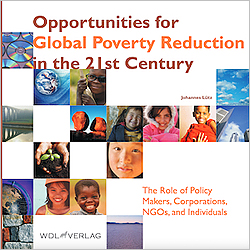 |
Luetz, J. M. (2007). Opportunities for Global Poverty Reduction in the 21st Century—The Role of Policy Makers, Corporations, NGOs, and Individuals. WDL-Verlag.
About this book:
Every hour of every day 1,200 children die from poverty-related causes. An afternoon may roughly be the time it takes to read through this book. Think about it – by the time you have finished reading this book, the world will be several thousand children “poorer.” In today’s globalized world, poverty is no longer beyond anyone’s reach but has been shown to reside right on our doorstep. Indeed, the world has “shrunk” into a global village. Imagine: What would the distribution of wealth look like if the world had only 1,000 inhabitants? 150 villagers would live in rich neighbourhoods, 780 in poor districts. About 100 people would own 85% of the wealth, while roughly half the village would fight daily for raw survival, on less than $2 per day. And yet, the ocean of opportunity is awash with an abundance of assets: it teems with life. Exploring the role of policy makers, corporations, NGOs and individuals, Opportunities for Global Poverty Reduction in the 21st Century heartily welcomes you to a motivating and hopeful tour of discovery.
WDL-Verlag (2nd Edition); Berlin, Germany (2007). Download/s: Table of Contents (2 pages, 30 KB), Reviewers' Preview (2 pages, 60 KB), Cover (2 pages, 1.2 MB),
front matter (pages i-iv, 100 KB). ISBN 978-3-86682-107-1
252 Pages (Hardcover). List Price: EUR 28.00
Available here |
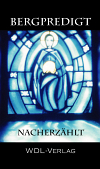 |
Luetz, J.M., Hierath T., Möller D., Stolpe O., & Yap W. W. (2004). Die Bergpredigt nacherzählt. matchBOOKS: Das Minibuch aus der Streichholzschachtel, 112 pp., WDL-Verlag Berlin. ISBN 978-3-932356-80-3
About this book:
Wenige Worte haben die Geschichte unseres Planeten so verändert wie die Bergpredigt des Jesus aus Nazareth. Es waren „zündende Gedanken“. Junge Leute von heute haben sie in eigenen Worten nacherzählt. Wir haben sie auf Mini-Format gedruckt und das hundertseitige Buch in eine Streichholzschachtel verpackt. Viele haben sich darüber gefreut: “Es ist wirklich eine gute Idee, solche ‘Matchbooks’ zu drucken. Ich habe schon mit Freude in dem kleinen Buch gelesen.” (Johannes Rau, Bundespräsident a.D.); “Dass junge Menschen sich daran machen, die Bergpredigt nachzuerzählen, ist in sich selbst ein Zeichen der Zuversicht.” (Richard von Weizsäcker, Bundespräsident a.D.). Weitere Echos und Infos zum Minibuch aus der Streichholzschachtel auf matchBOOKS.de .
WDL-Verlag Berlin, 2. durchges. Aufl. (2004)
ISBN 978-3-932356-80-3, 112 Seiten
Preis: EUR 5,00 (Einzelexemplar)
Erhältlich hier
|
ACADEMIC PUBLICATIONS — PEER REVIEWED RESEARCH ▲
- Luetz, J.M., & Leo, R.G. (2021). Christianity, Creation, and the Climate Crisis: Ecotheological Paradigms and Perspectives, In J.M. Luetz & P.D. Nunn (Eds.), Beyond Belief: Opportunities for Faith-Engaged Approaches to Climate-Change Adaptation in the Pacific Islands (pp. 345–375). Springer Nature, Switzerland. https://doi.org/10.1007/978-3-030-67602-5_18
- Luetz, J.M., & Rumsey, R. (2021). Pioneering Anticipatory Climate Change Management: A Pilot Study on World Vision’s Early Warning Early Action System (EWEAS), In Leal Filho, W., Luetz, J.M., & Ayal, D. (Eds.). (2021). Handbook of Climate Change Management: Research, Leadership, Transformation. Springer Nature, Switzerland. https://doi.org/10.1007/978-3-030-22759-3_106-1
- Luetz, J.M. & Green, B. (2021). Innovating Christian Education Research: Multidisciplinary Perspectives—An Introductory Overview, In J.M. Luetz & B. Green (Eds.), Innovating Christian Education Research: Multidisciplinary Perspectives (pp. 1–16). Springer Nature, Singapore. https://doi.org/10.1007/978-981-15-8856-3_1
- Raman, T.A., & Luetz, J.M. (2021). How Does Faith Influence Pro-Environmental Practice in Schools? Examples from the Pacific Islands, In J.M. Luetz & P.D. Nunn (Eds.), Beyond Belief: Opportunities for Faith-Engaged Approaches to Climate-Change Adaptation in the Pacific Islands (pp. 313–326). Springer Nature, Switzerland. https://doi.org/10.1007/978-3-030-67602-5_16
- Luetz, J.M. (2021). Longing and Belonging: Biographical and Biblical Reflections on Home and Homelessness, In I. Alexander & C.R. Ringma (Eds.) Pub Theology. Piquant.
- Nunn, P.D., & Luetz, J.M. (2021). Beyond Belief, In J.M. Luetz & P.D. Nunn (Eds.), Beyond Belief: Opportunities for Faith-Engaged Approaches to Climate-Change Adaptation in the Pacific Islands (pp. 1–14). Springer Nature, Switzerland. https://doi.org/10.1007/978-3-030-67602-5_1
- Buxton, G., Luetz, J.M., & Shaw, S. (2021). Towards an Embodied Pedagogy in Educating for Creation Care, In J.M. Luetz & B. Green (Eds.), Innovating Christian Education Research: Multidisciplinary Perspectives (pp. 349–375). Springer Nature, Singapore. https://doi.org/10.1007/978-981-15-8856-3_20
- Unger, J.M., Bhattarai, A., Maisch, B., Luetz, J.M., & Obuhuma, J. (2021). Fostering Innovation and Intercultural Exchange During a Global Pandemic: Lessons Learned from a Virtual Design Thinking Challenge in Nepal, In W. Leal Filho (Eds.), COVID-19: Paving the Way for a More Sustainable World (World Sustainability Series). Springer Nature, Switzerland. https://doi.org/10.1007/978-3-030-69284-1_10
- Luetz, J.M., Jackson, D., & McBurnie, K. (2020). Leadership and Sustainable Development: Perspectives, Principles and Practices. In W. Leal Filho, A. Marisa Azul, L. Brandli, P. Gökcin Özuyar, T. Wall (Eds.), Peace, Justice and Strong Institutions: Encyclopedia of the UN Sustainable Development Goals (pp. 1–19). Springer Nature, Switzerland. https://doi.org/10.1007/978-3-319-71066-2_105-1
- Tucker, S. & Luetz, J.M. (2021). Art Therapy and Prison Chaplaincy: A Review of Contemporary Practices Considering New Testament Teachings, In J.M. Luetz & B. Green (Eds.), Innovating Christian Education Research: Multidisciplinary Perspectives (pp. 239–269). Springer Nature, Singapore. https://doi.org/10.1007/978-981-15-8856-3_15
- Quak, D., & Luetz, J.M. (2020). Human Happiness: Conceptual and Practical Perspectives. In W. Leal Filho, A. Marisa Azul, L. Brandli, P. Gökcin Özuyar, T. Wall (Eds.), No Poverty: Encyclopedia of the UN Sustainable Development Goals (pp. 1–16). Springer Nature, Switzerland. https://doi.org/10.1007/978-3-319-69625-6_79-1
- Nelson, W., & Luetz, J.M. (2021). Towards Intercultural Literacy: A Literature Review on Immersive Cross-Cultural Experiences and Intercultural Competency, In J.M. Luetz & B. Green (Eds.), Innovating Christian Education Research: Multidisciplinary Perspectives (pp. 395–422). Springer Nature, Singapore. https://doi.org/10.1007/978-981-15-8856-3_22
- Ayre, C.W., Hills, K., & Luetz, J.M. (2021). Ecology, War, and Nuclear Testing in the Pacific: The Path of Reconciliation, In J.M. Luetz & P.D. Nunn (Eds.), Beyond Belief: Opportunities for Faith-Engaged Approaches to Climate-Change Adaptation in the Pacific Islands (pp. 17–37). Springer Nature, Switzerland. https://doi.org/10.1007/978-3-030-67602-5_2
- Seyed Aghamiri, F. & Luetz, J.M. (2021). Sexual Addiction and Christian Education: An Emerging Research Agenda, In J.M. Luetz & B. Green (Eds.), Innovating Christian Education Research: Multidisciplinary Perspectives (pp. 443–468). Springer Nature, Singapore. https://doi.org/10.1007/978-981-15-8856-3_24
- Leal Filho, W., Luetz, J.M., Sattler, D.N. and Nunn, P.D. (2020). Coronavirus: COVID-19 Transmission in Pacific Small Island Developing States. International Journal of Environmental Research and Public Health, 17, 5409. https://doi.org/10.3390/ijerph17155409
- Klingenberg, A., Luetz, J.M., & Crawford, A. (2020). Transnationalism: Recognising the Strengths of Dual Belonging for both Migrant and Society. Journal of International Migration and Integration, Open Access, Springer Nature B.V. https://doi.org/10.1007/s12134-019-00744-2
- Leal Filho, W., Ha’apio, M.O., Luetz, J.M., & Li, C. (2020). Climate change adaptation as a development challenge to small Island states: A case study from the Solomon Islands. Environmental Science & Policy, 107, 179–187. https://doi.org/10.1016/j.envsci.2020.03.008
- Luetz, J.M., & Nunn, P.D. (2020). Climate Change Adaptation in the Pacific Islands: A Review of Faith-Engaged Approaches and Opportunities. In Leal Filho W. (Eds.), Managing Climate Change Adaptation in the Pacific Region (Climate Change Management ed., pp. 293–311). Springer Nature, Switzerland. https://doi.org/10.1007/978-3-030-40552-6_15
- Havea, P.H., De Ramon N’ Yeurt, A., Tamani, A.T., Siga, A., Des Combes, H.J., Hemstock, S.L., & Luetz, J.M. (2020). Resilience in Education: An Example from Primary School in Fiji and Technical Vocational Education and Training. In Leal Filho W. (Eds.), Managing Climate Change Adaptation in the Pacific Region (Climate Change Management ed., pp. 197–212). Springer Nature, Switzerland. https://doi.org/10.1007/978-3-030-40552-6_10
- Baumber, A., Luetz, J.M., & Metternicht, G. (2020). Carbon Neutral Education: Reducing Carbon Footprint and Expanding Carbon Brainprint. In W. Leal Filho, A. Marisa Azul, L. Brandli, P. Gökcin Özuyar, T. Wall (Eds.), Quality Education: Encyclopedia of the UN Sustainable Development Goals (pp. 1–13). Springer Nature, Switzerland. https://doi.org/10.1007/978-3-319-69902-8_13-1
- Nelson, W., Fowler, C.F., & Luetz, J.M. (2020). Intercultural Education for Intercultural Competence: A New Kind of Literacy for Sustainable Development. In W. Leal Filho, A. Marisa Azul, L. Brandli, P. Gökcin Özuyar, T. Wall (Eds.), Quality Education: Encyclopedia of the UN Sustainable Development Goals (pp. 1–16). Springer Nature, Switzerland. https://doi.org/10.1007/978-3-319-69902-8_28-1
- Luetz, J.M. (2020). Disaster-Resistant Schools for Disaster-Resilient Education. In W. Leal Filho, A. Marisa Azul, L. Brandli, P. Gökcin Özuyar, T. Wall (Eds.), Quality Education: Encyclopedia of the UN Sustainable Development Goals (pp. 1–17). Springer Nature, Switzerland. https://doi.org/10.1007/978-3-319-69902-8_15-1
- Luetz, J.M, Margus, R., & Prickett, B. (2020). Human Behavior Change for Sustainable Development: Perspectives Informed by Psychology and Neuroscience. In W. Leal Filho, A. Marisa Azul, L. Brandli, P. Gökcin Özuyar, T. Wall (Eds.), Quality Education: Encyclopedia of the UN Sustainable Development Goals (pp. 1–16). Springer Nature, Switzerland. https://doi.org/10.1007/978-3-319-69902-8_12-1
- Chen, J.-M., & Luetz, J.M. (2020). Mono-/Inter-/Multi-/Trans-/Anti-disciplinarity in Research. In W. Leal Filho, A. Marisa Azul, L. Brandli, P. Gökcin Özuyar, T. Wall (Eds.), Quality Education: Encyclopedia of the UN Sustainable Development Goals (pp. 1–17). Springer Nature, Switzerland. https://doi.org/10.1007/978-3-319-69902-8_33-1
- Luetz, J.M. (2019). Over-researching migration ‘hotspots’? Ethical issues from the Carteret Islands. Forced Migration Review,(61), 20–22, The Ethics Issue (June 2019), Refugee Studies Centre, University of Oxford. https://www.fmreview.org/ethics/luetz; (Arabic) Podcast: MP3 Download
- Ripple, W.J., Wolf, C., Newsome, T.M., Barnard, P., Moomaw, W.R. and 11,258 scientist signatories [including Luetz, J.M.]. (2019). World Scientists’ Warning of a Climate Emergency. Bioscience, 70(1), 8-12. https://academic.oup.com/bioscience/article/70/1/8/5610806
- Luetz, J.M. (2019). Climate Refugees: Why Measuring the Immeasurable Makes Sense Beyond Measure. In W. Leal Filho, A. Marisa Azul, L. Brandli, P. Gökcin Özuyar, T. Wall (Eds.), Climate Action: Encyclopedia of the UN Sustainable Development Goals (Earth and Environmental Science ed., pp. 1–14). Springer Nature, Switzerland. https://doi.org/10.1007/978-3-319-71063-1_81-1
- Luetz, J.M., Bergsma, C., & Hills, K. (2019). The Poor just Might Be the Educators We Need for Global Sustainability—A Manifesto for Consulting the Unconsulted. In W. Leal Filho, & A. Consorte McCrea (Eds.), Sustainability and the Humanities (pp. 115–140). Springer Nature, Switzerland. https://doi.org/10.1007/978-3-319-95336-6_7
- Havea, P.H., Hemstock, S.L., Des Combes, H.J., Luetz, J.M., & Liava‘a, L.F.C. (2019). Impact of climate change on spirituality. Pacific Dynamics: Journal of Interdisciplinary Research, 3(1), 33–45. https://ir.canterbury.ac.nz/handle/10092/17365
- Luetz, J.M., & Merson, J. (2019). Climate Change and Human Migration as Adaptation: Conceptual and Practical Challenges and Opportunities. In W. Leal Filho, A. Marisa Azul, L. Brandli, P. Gökcin Özuyar, T. Wall (Eds.), Climate Action: Encyclopedia of the UN Sustainable Development Goals (Earth and Environmental Science ed., pp. 1–13). Springer Nature, Switzerland. https://doi.org/10.1007/978-3-319-71063-1_46-1
- Unger, J.M., & Luetz, J.M. (2019). Engaging Employees in Corporate Social Responsibility Projects—A Case Study from the Lufthansa Group Showcasing Experiences and Lessons Gathered in Kenya, Rwanda, Nigeria and Columbia. In W. Leal Filho (Eds.), Social Responsibility and Sustainability (World Sustainability Series, pp. 241–275). Springer Nature, Switzerland. https://doi.org/10.1007/978-3-030-03562-4_13
- Luetz, J.M., & Beaumont, S. (2019). Community Gardening: Integrating Social Responsibility and Sustainability in a Higher Education Setting—A Case Study from Australia. In W. Leal Filho (Eds.), Social Responsibility and Sustainability (World Sustainability Series, pp. 493–519). Springer Nature, Switzerland. https://doi.org/10.1007/978-3-030-03562-4_26
- Luetz, J.M., & Sultana, N. (2019). Disaster Risk Reduction Begins at School: Research in Bangladesh Highlights Education as a Key Success Factor for Building Disaster Ready and Resilient Communities—A Manifesto for Mainstreaming Disaster Risk Education. In W. Leal Filho, B. Lackner, & H. McGhie (Eds.), Addressing the Challenges in Communicating Climate Change Across Various Audiences (Climate Change Management, pp. 617–646). Springer Nature, Switzerland. https://doi.org/10.1007/978-3-319-98294-6_37
- Luetz, J.M., & Walid, M. (2019). Social Responsibility versus Sustainable Development in United Nations Policy Documents: A Meta-Analytical Review of Key Terms in Human Development Reports. In W. Leal Filho (Eds.), Social Responsibility and Sustainability (World Sustainability Series, pp. 301–334). Springer Nature, Switzerland. https://doi.org/10.1007/978-3-030-03562-4_16
- Nelson, W., & Luetz, J.M. (2019). What Can We Learn from Pope Francis About Change Management for Environmental Sustainability? A Case Study on Success Factors for Leading Change in Change-Resistant Institutional Environments. In W. Leal Filho, & A. Consorte McCrea (Eds.), Sustainability and the Humanities (pp. 503–524). Springer Nature, Switzerland. https://doi.org/10.1007/978-3-319-95336-6_29
- Havea, P.H., Hemstock, S.L., Des Combes, H.J., & Luetz, J.M. (2018). “God and Tonga Are My Inheritance!”—Climate Change Impact on Perceived Spirituality, Adaptation and Lessons Learnt from Kanokupolu, ‘Ahau, Tukutonga, Popua and Manuka in Tongatapu, Tonga. In W. Leal Filho (Eds.), Climate Change Impacts and Adaptation Strategies for Coastal Communities (pp. 167–186). Springer Nature, Switzerland. https://doi.org/10.1007/978-3-319-70703-7_9
- Klingenberg, A., Luetz, J.M., & Crawford, A. (2018). Mitigating Developmental Crises for Migrants from South Africa: The Role and Significance of ‘Sense of Belonging’. Psychotherapy and Counselling Journal of Australia (PACJA) 6(1). https://pacja.org.au/?p=4581
- Luetz, J.M., & Havea, P.H. (2018). “We’re not Refugees, We’ll Stay Here Until We Die!”—Climate Change Adaptation and Migration Experiences Gathered from the Tulun and Nissan Atolls of Bougainville, Papua New Guinea. In W. Leal Filho (Eds.), Climate Change Impacts and Adaptation Strategies for Coastal Communities (pp. 3–29). Springer Nature, Switzerland. https://doi.org/10.1007/978-3-319-70703-7_1
- Luetz, J.M., Buxton, G., & Bangert, K. (2018). Christian Theological, Hermeneutical and Eschatological Perspectives on Environmental Sustainability and Creation Care—The Role of Holistic Education. In J.M. Luetz, T. Dowden, & B. Norsworthy (Eds.), Reimagining Christian Education—Cultivating Transformative Approaches (pp. 51–73). Springer Nature, Singapore. https://doi.org/10.1007/978-981-13-0851-2_4
- Luetz, J.M. (2018). Climate Change and Migration in Bangladesh: Empirically Derived Lessons and Opportunities for Policy Makers and Practitioners. In W. Leal Filho, & J. Nalau (Eds.), Limits to Climate Change Adaptation (pp. 59–105). Video documentary. Springer Nature, Switzerland. https://doi.org/10.1007/978-3-319-64599-5_5
- Walid, M., & Luetz, J.M. (2018). From Education for Sustainable Development to Education for Environmental Sustainability: Reconnecting the Disconnected SDGs. In W. Leal Filho (Eds.), Handbook of Sustainability Science and Research (pp. 803–826). Springer Nature, Switzerland. https://doi.org/10.1007/978-3-319-63007-6_49
- Norsworthy, B., Dowden, T., & Luetz, J.M. (2018). Learning and Loves Envisaged Through the Lens of James K. A. Smith—Reimagining Christian Education Today. In J.M. Luetz, T. Dowden, & B. Norsworthy (Eds.), Reimagining Christian Education—Cultivating Transformative Approaches (pp. 3–15). Springer Nature, Singapore. https://doi.org/10.1007/978-981-13-0851-2_1
- Luetz, J.M. (2017). Climate Change and Migration in the Maldives: Some Lessons for Policy Makers. In W. Leal Filho (Eds.), Climate Change Adaptation in Pacific Countries (pp. 35–69). Springer Nature, Switzerland. https://doi.org/10.1007/978-3-319-50094-2_3
- Klingenberg, A., Luetz, J.M., & Crawford, A. (2017). Identity Development of Transnational South African Migrants to Australia: Research Informed Implications for Counsellors. Counselling Connections Across Australia: CCAA Journal, Vol. 8 (October 2017), pp. 12–18.
|
DOCTORAL DISSERTATION ▲
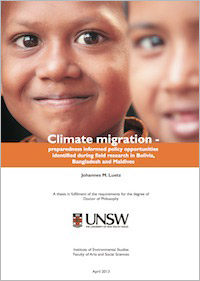 |
Doctoral Dissertation: Luetz, J M (2013) Climate Migration: Preparedness Informed Policy Opportunities Identified During Field Research in Bolivia, Bangladesh and Maldives. A thesis in fulfilment of the requirements for the degree of Doctor of Philosophy (Ph.D.). Thesis: 388 pp; Appendix: 112 pp. Submitted to the University of New South Wales (UNSW) on 28 March 2013. Degree conferred 10 October 2013. Graduated 7 November 2013.
Ph.D. Thesis Abstract: High levels of human mobility brought on by global megatrends such as population growth, urbanisation, globalisation, coastward migration, environmental degradation, resource depletion, and sprawling of slums in developing countries are likely to be reinforced by climate change, making it plausible that human mobility will increase significantly during the 21st Century. Within the academic, development and international community there is no uniform view how this potentiality should be faced, but projections typically agree that the majority of this migration can be expected to occur in developing countries characterised by high levels of poverty and vulnerability. Moreover, it can be observed that a significant amount of climate change related migration is already underway. A review of the literature reveals knowledge gaps with respect to both interdisciplinary and local-level research that expressly invites the perspectives of climate migrants. This dissertation responds to these gaps both by drawing on literature in several fields of inquiry, and by intentionally engaging with migration-affected populations to identify what preferred solutions they envisage. Taking a humanitarian preparedness approach, this research seeks to identify what migrants want so that appropriate policy instruments for equitable macro-managed migration processes can be discussed, developed, drafted and legislated well before they are needed. To this end, this research aims to learn from various forms of current migrations, which may or may not all be climate induced. At its simplest, this thesis argues that policy preparedness is the a priori policy posture of choice. Drawing on fieldwork conducted in Bolivia, Bangladesh and the Maldives, this research repositions climate migrants at the centre of a scholarly debate that has largely marginalised or even patronised them. It concludes: (1) inviting the contributions of migrants leads to preferable migration outcomes; (2) policy maker foresight is an important success factor; (3) targeted service provision can enable more positive migration outcomes; (4) many migrants wish to stay in their countries/communities, thereby highlighting the importance of in situ adaptation; (5) nomenclature is a non-problem in the minds of most migrants; (6) accountable and responsive government institutions have a key role to play in enabling anticipatory migrations; (7) education is the sine qua non for all future migration preparedness.
Relevant Resources: download thesis (5.8 MB) from this website; download thesis from UNSW Library; download abstract (220 KB). A few Ph.D. documentaries have been published online with field research footage captured on site in Bolivia, Bangladesh and the Maldives. A short talk is available on communicating the essence of the Ph.D. research in simple language in the public domain.
|
RESEARCH REPORTS AND OTHER WRITINGS ▲
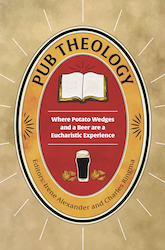 |
Luetz, J.M. (2021). Longing and Belonging: Biographical and Biblical Reflections on Home and Homelessness, In I. Alexander & C.R. Ringma (Eds.) Pub Theology. Piquant.
Welcome to my colourful and confused world. We are five, between us we speak five languages. My wife was raised between Bolivia and Italy and spent extended periods of time in Mexico and Germany. I was raised in Sierra Leone, Switzerland, UK, Germany and Australia, plus extended periods of time in Singapore, USA, Costa Rica, South Africa, Estonia, Bolivia, among others. Our most dreaded question: Where are you from? When we got married, we had to choose a ‘family name’ and opted for the Bolivian naming convention. It seemed to make sense — or so we thought. In hindsight I often wonder … we now have three different last names for the categories father, mother, and children. In synthesis, we are a blend of five, multiple backgrounds, multiple cultures, multiple languages, multiple last names. Are we confused enough? Come and find out. Hear a talk where the speaker tries to explain all this to himself. His talk includes biographical and biblical reflections on longing and belonging, home and homelessness. He also draws on findings from his Ph.D. research, which was (you guessed it) — international migration. |
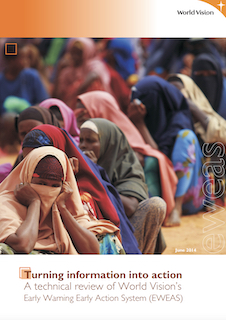 |
Luetz, J.M. (2014). Turning information into action: A technical review of World Vision’s Early Warning Early Action System (EWEAS). World Vision International, London / Los Angeles, June, 28 pp.
‘Turning Information into Action’ presents a technical review of the implementation of World Vision’s Early Warning Early Action System (EWEAS) after 18 months of field testing in 13 countries in the East and Southern Africa region following the 2011 Horn of Africa (HoA) food crisis. EWEAS is not merely concerned with the need for better disaster prediction and early humanitarian response but also with ‘the need for a fundamental shift in development practice.’
Download Report |
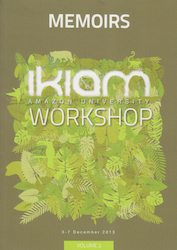 |
Long, G. & López, M. (Eds.) and 60 invited academics [including Luetz, J.M.] (2014). IKIAM Amazon University Workshop Memoirs (3–7 December 2013; Vol 2, 3, 5). Ministry of Knowledge and Human Talent, Quito, Ecuador.
[Conference scope: One of 60 academics invited to review IKIAM Universidad Regional Amazónica: Proposal for the Establishment of the Amazonian University IKIAM in Ecuador.]
About the Memoirs:
The IKIAM Amazon University Workshop [program] addressed the following objectives: (1) Primary Objective: To discuss the Academic Proposal for the Establishment of The University of the Amazon – IKIAM, its guiding principles and aims, its academic and organizational structure, its governance system and internal management policies, research strategies, as well as the University’s interaction with Ecuador’s National Development Strategy, and the national and international higher education systems. (2) Secondary Objectives: (a) To stimulate interdisciplinary debate between participants on each of the topics and subtopics contained in the discussion panels and focus groups; (b) To ascertain the existing academic proposal for IKIAM, and to identify and discuss alternative models for the University; (c) To identify gaps and needs in the establishment of the University, and discuss mechanisms to address them; (d) To build national and international networks, and generate collaboration on the knowledge areas of IKIAM; (e) To identify potential national and international partnerships for the establishment and development of the University. |
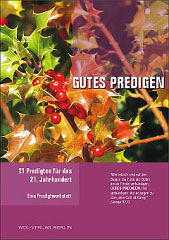 |
Luetz, J.M. (2004). ‘Johannes 3, 16’. In Luetz, W.D. (Eds.), Gutes Predigen: 21 Predigten mit je einer Anleitung, Gutes gut zu predigen(pp. 174–183). WDL-Verlag Berlin. ISBN 978-3-932356-78-0.
Eine Predigtwerkstatt mit Beiträgen von W. Bergemann, A. Giebel, N. Giebel, K. Jägemann, D. Lütz (Hg.), J. Lütz, H. Mallau, M. Noss, G. Piel, O. Pilnei, A. Riemenschneider, E. Rockel, J. Rosemann, I. Stanullo, A. Strübind, K. Strübind, J. Swoboda, V. Tepp, H. Wahl, K. Wlodarek, C. Wolf.
GUTES PREDIGEN hat auch heute Seltenheitswert. Das zu ändern, ist erklärtes Ziel des vorliegenden Predigtbandes. Der Titel dieses Buches ist absichtlich doppeldeutig formuliert. GUTES PREDIGEN kann ja einmal den Inhalt bezeichnen, dann geht es darum, GUTES zu predigen. Es kann aber auch für die Kunst stehen, gut zu PREDIGEN. Vielfältig sind auch die Predigenden selbst: Mit 85 Jahren sind die ältesten fast dreimal so alt und reich an Erfahrung wie die jüngsten mit 30. Aber eins verbindet sie alle: die Leidenschaft zu predigen.
WDL-Verlag Berlin, 2. durchges. Aufl. (2005)
ISBN 978-3-932356-78-0, 256 Seiten
Preis: EUR 15,00 (FBTh Bd. 11)
|
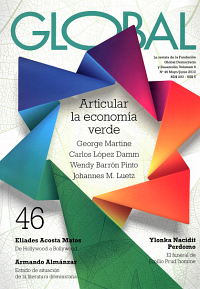 |
Sorprendido por la sorpresa: Investigación realizada en las comunidades guaraníes del Chaco boliviano desplazadas por la sequía
Autores: Johannes M Luetz y Wendy Barrón Pinto
En los últimos años el concepto de “estado de preparación” (preparedness en inglés) ganó adeptos en los círculos humanitarios y de gestión de desastres. Pero, ¿podría surgir también como un marco conceptual útil en situaciones donde las personas luchan para enfrentar la migración forzada a causa del cambio climático? El artículo presenta la investigación realizada en las comunidades guaraníes del Chaco boliviano desplazadas por la sequía, y demuestra que los jóvenes emigrantes rurales que se dirigían a las ciudades escapaban de un desastre pero se enfrentaban a otros problemas; en estas situaciones, el concepto humanitario de “preparación” puede garantizar procesos y resultados más equitativos.
Revista de la Fundación Global Democracia y Desarrollo (FUNGLODE)
Vol 9. No 46. (Mayo/Junio 2012)
Páginas 46-53, 2.2 MB
|
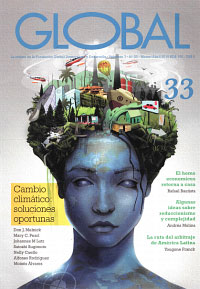 |
Se Busca Liderazgo
Cambio Climático post-Copenhague 2009
Autor: Johannes M Luetz
Escribir sobre el cambio climático post-Copenhague 2009 ya no puede hacerse principalmente sobre la ciencia del clima, sino en la base del liderazgo. La inmensa montaña de evidencia científica revisada por expertos que ha sido acumulada en las dos últimas décadas, ha puesto a la humanidad a tomar medidas sólidas sobre el cambio climático y traducir el consenso científico en acciones políticas decisivas y en reformas sociales amplias. Ya que los sistemas, las estructuras los mercados conspiran para mantener el statu quo y evitar el cambio, es necesario un liderazgo sin precedentes para evitar la que probablemente sea la amenaza más grave a la que jamás se haya enfrentado la humanidad. Este artículo expone el caso científico para llevar adelante una acción vanguardista sobre este fenómeno ambiental y discute por qué un liderazgo valiente es el último rayo de esperanza del mundo en la hora final.
Revista de la Fundación Global Democracia y Desarrollo (FUNGLODE)
Vol 6. No 33. (Marzo/Abril 2010). [Text in English: 9 pages, 1.9 MB]
Páginas 46-53, 3.1 MB
|
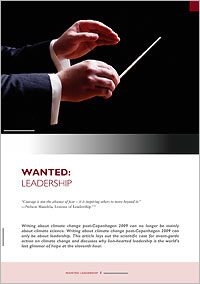 |
Wanted: Leadership
Climate Change Leadership post-Copenhagen 2009
Author: Johannes M Luetz
Writing about climate change post-Copenhagen 2009 can no longer be mainly about climate science. Writing about climate change post-Copenhagen 2009 can only be about leadership. The huge mountain of peer-reviewed scientific evidence amassed in the last two decades has charged humanity to take robust action on climate change, and to translate the scientific conclusions into decisive political action and comprehensive societal reform. Since systems, structures and markets conspire to maintain the status quo and prevent change, unprecedented leadership is needed to stave off what is likely the gravest threat ever to have faced humanity. This article lays out the scientific case for avant-garde action on climate change and discusses why lion-hearted leadership could be the world’s last glimmer of hope at the eleventh hour.
Revista de la Fundación Global Democracia y Desarrollo (FUNGLODE)
Published in Spanish: Vol 6. No 33. Marzo/Abril 2010 (Páginas 46-53, 3.1 MB)
Aailable in English: 9 Pages, 1.9 MB
|
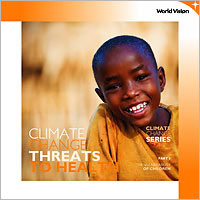 |
Climate Change Threats to Health
Climate Change Series (Part 3) — The Vulnerability of Children
Lead Author: Gerard Finnigan
Series Editor, Producer: Johannes M Luetz
In this series of publications World Vision seeks to identify concrete responses to climate change both at the programming and policy levels.
Over recent years climate change has emerged as a new driver of malnutrition. In the wake of the 2008 food crisis, the number of children with this life-threatening condition escalated, increasing mortality rates by 5-20 times. The climate emergency is poised to exacerbate children’s risk to physical injury, malnutrition and infection. For decades World Vision has worked with developing communities to help them carry an already heavy health burden from malnutrition, diarrhoea and vector-borne diseases. With climate change threatening to unravel decades of development, efforts to curb existing vulnerabilities and mainstream child-focused adaptation into development programming must be urgently stepped up. Ultimately the success of humanity adapting to a continually changing environment will be intrinsically tied to protecting the health and well-being of children. This publication explores ways and means.
Melbourne, World Vision Australia (2009)
ISBN 978-0-9807094-6-9
36 Pages, 8.9 MB
|
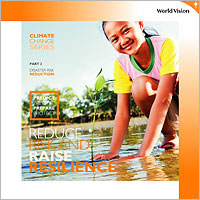 |
Reduce Risk and Raise Resilience
Climate Change Series (Part 2) — Disaster Risk Reduction
Lead Author: David Lansley; Co-Author: Kirsten Donaldson
Series Editor, Producer: Johannes M Luetz
In this series of publications World Vision seeks to identify concrete responses to climate change both at the programming and policy levels.
Around the globe World Vision is witnessing first hand the devastating impact of climate change on poor communities. Governments, non-governmental organisations and communities are grappling to adapt to new threats and their impacts. We have much to learn. Over recent decades the number and severity of disasters has risen steadily. While the disaster events themselves cannot always be prevented, their risk can be significantly reduced through preparedness. This publication explores why a warming world makes disaster risk reduction and increased resilience more and more indispensable. The rationale is straightforward. Disasters can wipe out years of development gains overnight. This happened in 2008 when in one night Cyclone Nargis wreaked havoc. With a death toll of more than 140,000 people, Cyclone Nargis entered the history books as one of the deadliest cyclones of all times. Reducing disaster risk lies at the heart of sustainable development.
Melbourne, World Vision Australia (2009)
ISBN 978-0-9807094-5-2
32 Pages, 6.3 MB
|
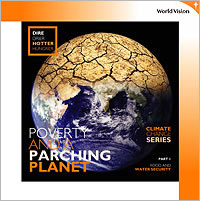 |
Poverty and a Parching Planet
Climate Change Series (Part 1) — Food and Water Security
Lead Author: David Lansley; Co-Author: Kirsten Donaldson
Series Editor, Producer: Johannes M Luetz
In this series of publications World Vision seeks to identify concrete responses to climate change both at the programming and policy levels.
Over recent decades water scarcity has become more frequent, and scientists are observing a process of increased parching. Climate change is the dominant driver. The challenges to food and water security in the 21st century are unprecedented. The United Nations Development Programme estimates that unchecked, by 2080 climate change may increase the number of malnourished people by 600 million and increase the number of people facing water scarcity by 1.8 billion. Combine these forecasts with current trends in precipitation patterns, population growth, urbanisation, higher per capita calorie intake, and increasing meat consumption, and it is a recipe for disaster, with enormous potential for conflicts over water resources. With more than half a century of experience working in many of the most food and water insecure countries, World Vision is committed to helping the poorest adapt to a drier and potentially dire future. This publication explores ways and means.
Melbourne, World Vision Australia (2009)
ISBN 978-0-9807094-4-5
48 Pages, 8.7 MB
|
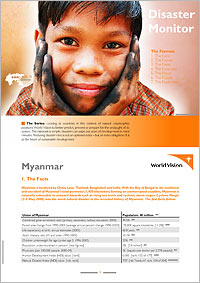 |
Myanmar —
Disaster Monitor Fact Sheet (5)
Lead Author: Johannes M Luetz
Concept & Production: Johannes M Luetz
This series of research fact sheets commissioned by World Vision Asia Pacific warns of the vulnerability of developing communities in the face of climate change. Over recent decades, the number and severity of natural disasters has risen steadily. While scientists worldwide ponder the causes of rising sea levels and increased disaster activity, World Vision’s fact sheets aim to help Asia and the Pacific prepare for the effects. Looking at countries in the context of natural catastrophes positions World Vision to better predict, prevent or prepare for the onslaught of disasters. The rationale is simple: disasters can wipe out years of development in mere minutes. Reducing disaster risk is not an optional extra – but an extra obligation. It is at the heart of sustainable development. This series aims to position the Asia Pacific for heightened disaster preparedness.
World Vision Asia Pacific Regional Office
Bangkok, Thailand (2008)
8 Pages, 2.6 MB
|
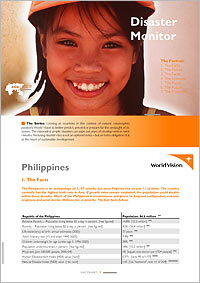 |
Philippines —
Disaster Monitor Fact Sheet (4)
Lead Author: Johannes M Luetz
Concept & Production: Johannes M Luetz
This series of research fact sheets commissioned by World Vision Asia Pacific warns of the vulnerability of developing communities in the face of climate change. Over recent decades, the number and severity of natural disasters has risen steadily. While scientists worldwide ponder the causes of rising sea levels and increased disaster activity, World Vision’s fact sheets aim to help Asia and the Pacific prepare for the effects. Looking at countries in the context of natural catastrophes positions World Vision to better predict, prevent or prepare for the onslaught of disasters. The rationale is simple: disasters can wipe out years of development in mere minutes. Reducing disaster risk is not an optional extra – but an extra obligation. It is at the heart of sustainable development. This series aims to position the Asia Pacific for heightened disaster preparedness.
World Vision Asia Pacific Regional Office
Bangkok, Thailand (2008)
8 Pages, 2.2 MB
|
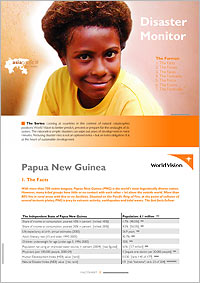 |
Papua New Guinea —
Disaster Monitor Fact Sheet (3)
Lead Author: Johannes M Luetz
Concept & Production: Johannes M Luetz
This series of research fact sheets commissioned by World Vision Asia Pacific warns of the vulnerability of developing communities in the face of climate change. Over recent decades, the number and severity of natural disasters has risen steadily. While scientists worldwide ponder the causes of rising sea levels and increased disaster activity, World Vision’s fact sheets aim to help Asia and the Pacific prepare for the effects. Looking at countries in the context of natural catastrophes positions World Vision to better predict, prevent or prepare for the onslaught of disasters. The rationale is simple: disasters can wipe out years of development in mere minutes. Reducing disaster risk is not an optional extra – but an extra obligation. It is at the heart of sustainable development. This series aims to position the Asia Pacific for heightened disaster preparedness.
World Vision Asia Pacific Regional Office
Bangkok, Thailand (2008)
8 Pages, 2.4 MB
|
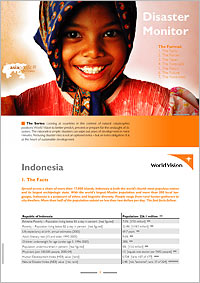 |
Indonesia —
Disaster Monitor Fact Sheet (2)
Lead Author: Johannes M Luetz
Concept & Production: Johannes M Luetz
This series of research fact sheets commissioned by World Vision Asia Pacific warns of the vulnerability of developing communities in the face of climate change. Over recent decades, the number and severity of natural disasters has risen steadily. While scientists worldwide ponder the causes of rising sea levels and increased disaster activity, World Vision’s fact sheets aim to help Asia and the Pacific prepare for the effects. Looking at countries in the context of natural catastrophes positions World Vision to better predict, prevent or prepare for the onslaught of disasters. The rationale is simple: disasters can wipe out years of development in mere minutes. Reducing disaster risk is not an optional extra – but an extra obligation. It is at the heart of sustainable development. This series aims to position the Asia Pacific for heightened disaster preparedness.
World Vision Asia Pacific Regional Office
Bangkok, Thailand (2008)
8 Pages, 2.4 MB
|
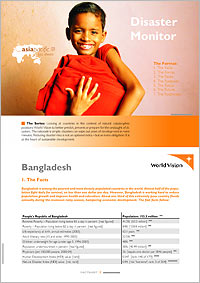 |
Bangladesh —
Disaster Monitor Fact Sheet (1)
Lead Author: Johannes M Luetz
Concept & Production: Johannes M Luetz
This series of research fact sheets commissioned by World Vision Asia Pacific warns of the vulnerability of developing communities in the face of climate change. Over recent decades, the number and severity of natural disasters has risen steadily. While scientists worldwide ponder the causes of rising sea levels and increased disaster activity, World Vision’s fact sheets aim to help Asia and the Pacific prepare for the effects. Looking at countries in the context of natural catastrophes positions World Vision to better predict, prevent or prepare for the onslaught of disasters. The rationale is simple: disasters can wipe out years of development in mere minutes. Reducing disaster risk is not an optional extra – but an extra obligation. It is at the heart of sustainable development. This series aims to position the Asia Pacific for heightened disaster preparedness.
World Vision Asia Pacific Regional Office
Bangkok, Thailand (2008)
8 Pages, 2.1 MB
|
Research Proposals ▲
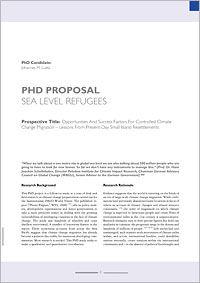 |
PhD Proposal: Sea Level Refugees — Opportunities And Success Factors For Controlled Climate Change Migration — Lessons From Present-Day Small Island Resettlements
PhD Candidate Johannes M Luetz
Research suggests that the world could be teetering on the brink of an era of large-scale climate change migration. While civilisations have previously abandoned some locations in favour of others on account of climatic changes and related resource constraints, the order of magnitude on which climate change may create environmental migrants in the 21st century is unprecedented. Quantitative research estimates vary but hold one similarity in common: the prognoses range in the millions of people. Left unchecked and unmanaged, such massive-scale movements of climate migrants within, and across, international borders, could destabilise nations internally, create tensions within the international community and – in the absence of political forethought and management – become a formula for protracted, bloody conflicts and human misery. This PhD research seeks to raise policy options for anticipatory rather than reactionary migration management so that appropriate policy mechanisms can be discussed, developed, drafted and legislated well before they are needed.
Berlin, Germany (2009)
Text version, draft
8 Pages, 130 KB
|
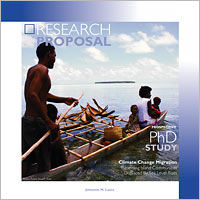 |
PhD Proposal: Sea Level Refugees — Opportunities And Success Factors For Controlled Climate Change Migration — Lessons From Present-Day Small Island Resettlements
PhD Candidate Johannes M Luetz
This PhD research is a follow-on study to a year of desk and field research on climate change preparedness carried out for the humanitarian INGO World Vision. The published report Planet Prepare: Preparing Coastal Communities in Asia For Future Catastrophes (124 Pages, 8.1 MB) calls on policy makers, development organisations and donor governments to take a more proactive stance in dealing with the growing vulnerabilities of developing countries in the face of climate change. The initial study saw hundreds of islanders and coast dwellers interviewed, and a number of interviews are featured in the report. These eyewitness accounts from across the Asia Pacific suggest that climate change migration has already become a present-day reality for numerous developing communities. More research is needed. By engaging with affected communities at grassroots level this qualitative and quantitative PhD study seeks to raise policy options which may lead to more equitable migration management processes and outcomes.
Berlin, Germany (2009)
Picture version, draft
12 Pages, 1.7 MB
|
|



























